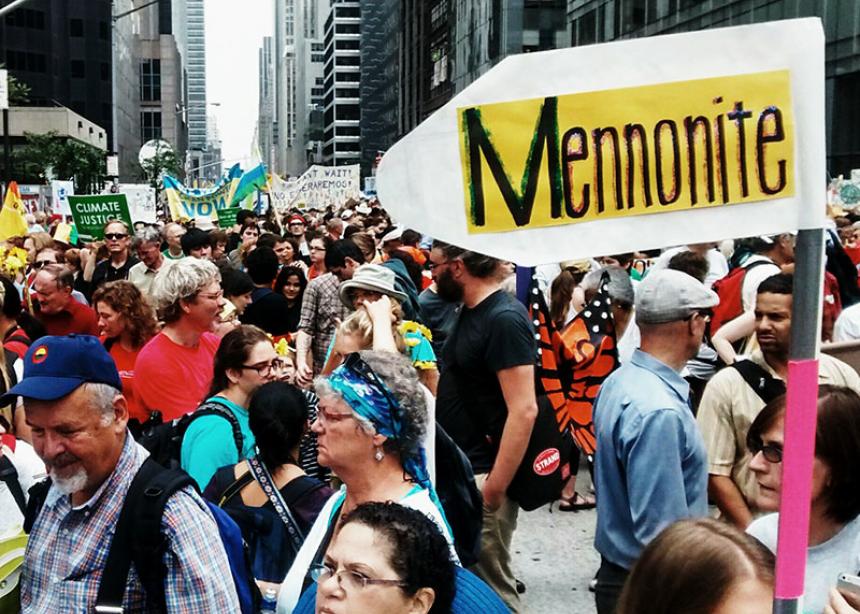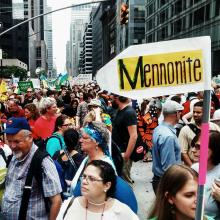Before 120 political leaders gathered at the request of the United Nations secretary-general Ban Ki-Moon for a summit on climate change, and before more than 300,000 people marched through the streets of New York for the People’s Climate March, religious leaders from around the world gathered to consider the threat posed by climate change.
They met on Sept. 21 and 22, 2014, in New York for an Interfaith Summit on Climate Change organized by Religions for Peace and the World Council of Churches (WCC), that culminated in signing “Climate, faith and hope: Faith traditions together for a common future,” a statement to highlight the importance of religious engagement with climate change.
In a speech to the Interfaith Summit, Christiana Figueres, executive secretary of the UN Framework Convention on Climate Change, the organization that oversees international negotiations, called on religious groups around the world to tackle the issue. Figueres urged religions to “find their voice on climate change” and to mobilize against what is increasingly being called the “greatest moral issue of our time.”
The climate march and signing of the Interfaith Statement fell on the UN’s World Day of Peace, Sept. 21, pointed out Doug Hostetter of Mennonite Central Committee’s United Nations Office in New York. Climate change “is linked to conflict as we have abused this planet,” he said. “It has affected water, grazing lands, resources all over the world, so peace and climate change is a link we have tried hard to make.”
It was those consequences and the shared sense of duty that characterized the gathering, which ended with a spectacular multifaith ceremony on the evening of Sept. 21 at the Episcopalian Cathedral of Saint John the Divine. Many of the participants had been on the massive People’s Climate March that afternoon in New York City.
“The twin sides of my faith [are] doing and worshipping,” said a Christian leader from the Pacific Islands, which are experiencing storm surges from sea-level rise and saline encroachment on fresh water.
“We stand together to express deep concern for the consequences of climate change on the earth and its people, all entrusted, as our faiths reveal, to our common care,” read Bhai Mohinder Singh Ahluwalia, a Sikh leader from the United Kingdom, from the first paragraph of the Interfaith Statement on Climate Change. More than a dozen leaders read successively from the document.
“We acknowledge the overwhelming scientific evidence that climate change is human-induced,” the statement acknowledged. (To read the full text, visit interfaithclimate.org.)
The question of hope came up frequently at the Religions for the Earth conference that took place at Union Theological Seminary from Sept. 19 to 21. A sense of urgency was prevalent for many as the scientific evidence continues to mount, and natural conditions upon which human societies depend begin to change in ways attributable to human-originated fossil-fuel emissions, deforestation and land practices.
“I waver between the rising balloons of optimism and the brick bats of cynicism,” said a participant.
Another speaker responded by drawing on her heritage as an African-American: “This is the gift of faith. For us, tragedy and hope exist. There’s honesty in grieving, but we learned through that horror of our history that we have a choice. So, choose hope!”
No Anabaptist leaders were present at the Interfaith Summit as signatories or observers.
Smaller climate marches happened around the world and in many Canadian cities. Mark Bigland-Pritchard of Osler Mennonite Church in Saskatchewan said climate change is pretty abstract, but people hear about it a lot. “So a march is a step people can take,” he said. “They can take other steps, like changing light bulbs, but then they wonder what’s next.”
Other Mennonites have begun a climate fast the first day of each month.
A campaign run by Mennonite Central Committee U.S. is the Faith Climate Petition to urge political leaders there to take action.
Citizens for Public Justice has suggestions for churches on a climate page on its website (cpj.ca).
Fossil-fuel divestment encouraged
Religions for the Earth ended with a web-based campaign to encourage the world’s religious citizens to speak up by visiting www.ourvoices.net.
The most far-reaching proposals include efforts to divest from fossil fuels. Several charitable foundations, led by the Rockefeller Brothers Fund, announced at the event that it was divesting from fossil fuels.
Figueres gave a speech in May to the WCC with the same call for divestment. In July, the WCC central committee voted to eliminate its investments in fossil-fuel companies, news which received no media coverage in Canada.
“When the organization that accounts for half a billion Christians makes such a significant step, one would think someone would notice in a fossil-fuel-dependent country,” said blogger David Climenhaga from Alberta.
Other churches and seminaries have begun divestment processes. At the Mennonite Church Canada assembly this summer in Winnipeg, a resolution was passed for the church to study the climate-change issue and make recommendations to local congregations and the national church.
Organizers of Fossil-Free Menno are hopeful that this will lead Mennonites to think about the issue and take steps in the wake of the WCC decision and attention to events like the Climate Summit.
See also:




Add new comment
Canadian Mennonite invites comments and encourages constructive discussion about our content. Actual full names (first and last) are required. Comments are moderated and may be edited. They will not appear online until approved and will be posted during business hours. Some comments may be reproduced in print.